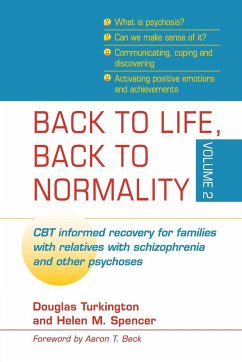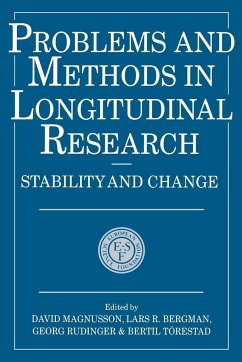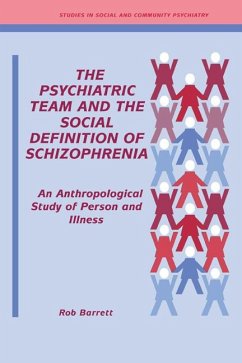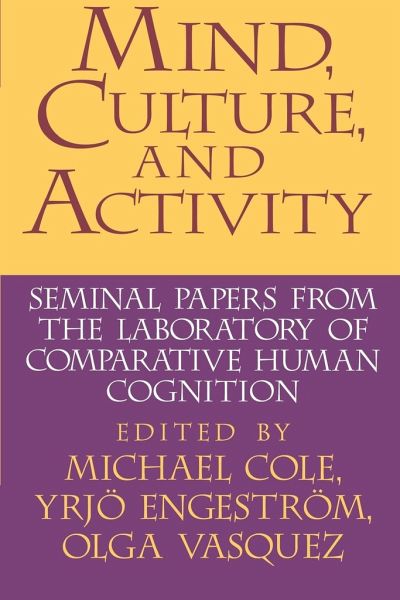
Mind, Culture, and Activity
Seminal Papers from the Laboratory of Comparative Human Cognition
Herausgeber: Cole, Michael; Engestrom, Yrjo; Vasquez, Olga A.

PAYBACK Punkte
33 °P sammeln!
This volume brings together articles from the Quarterly Newsletter of the Laboratory of Comparative Human Cognition that are important benchmarks in the recent history of research and theory on the cultural and contextual foundations of human development. The central theme of this discussion can be posed as a question: how shall we develop a psychology that takes as its starting point the actions of people participating in routine, culturally organized activities? The discussion is organized in terms of a set of overarching themes of importance to psychologists and other social scientists: The...
This volume brings together articles from the Quarterly Newsletter of the Laboratory of Comparative Human Cognition that are important benchmarks in the recent history of research and theory on the cultural and contextual foundations of human development. The central theme of this discussion can be posed as a question: how shall we develop a psychology that takes as its starting point the actions of people participating in routine, culturally organized activities? The discussion is organized in terms of a set of overarching themes of importance to psychologists and other social scientists: The nature of context; experiments as contexts; cultural historical theories of culture, context, and development; the analysis of classroom settings as a social important context of development, the psychological analysis of activity in situ, and questions of power and discourse.
Table of contents:
1. Introduction to the 'Mind, Culture, Activity' Michael Cole, Yrjo Engestrom and Olga Vasquez; 2. When is a context? Some issues and methods in the analysis of social competence Frederick Erickson and Jeffrey Schultz; 3. Plying frames can be dangerous: some reflections on methodology in cognitive anthropology Charles O. Frake; Part I. Experiments as Contexts: 4. Concepts of ecological validity: their differing implications for comparative cognitive research Michael Cole, Lois Hood and Raymond P. McDermott; 5. What's special about experiments as contexts for thinking? Jean Lave; 6. Sociolinguistic structure of word lists and ethnic-group differences in categorized recall Anderson F. Franklin; 7. Looking for Big Bird: studies of memory in very young children Judy S. DeLoache and Ann L. Brown; 8. 'Body Analogy' and the cognition of rotated figures Yutaka Sayeki; 9. Paradigms and prejudice Laboratory of Comparative Human Cognition; 10. The early history of the Vygotskian school: the relationship between mind and activity Norris Minick; 11. One developmental line in European activity theories Eric Axel; 12. Activity, consciousness and communication David Bakhurst; 13. The sound of the violin Ernest E. Boesch; 14. Non-Cartesian artefacts in dwelling activities: steps towards a semiotic ecology Alfred Lang; Part II. Historical Analysis: 15. The invention of writing and the development of numerical concepts in Sumeria: some implications for developmental psychology Ageliki Nicoloupoulou; 16. Collective memory: issues from a socio-historical perspective James Wertsch; 17. Students' interactional competence in the classroom Hugh Mehan; 18. The competence/incompetence paradox in the education of minority culture children R. Gallimore and K. Hu-Pei-Au; 19. The organization of bilingual lessons: implications for schooling Luis C. Moll, Elette Estrada, Esteban Diaz and Lawrence Lopes; 20. Kanji help readers of Japanese infer the meaning of unfamiliar words G. Hatano, K. Kuhara and M. Akiyama; 21. Functional environments for microcomputers in education Denis Newman; 22. 'But it's important data!': making the demands of a cognitive experiment meet the educational imperatives of the classroom M. G. Quinsaat; 23. Performance before competence: assistance to child discourse in the zone of proximal development Courtney Cazden; Part III. Cognition in the Wild: 24. Low-income children's pre-school literary experiences: some naturalistic observations Alonzo B. Anderson, William H. Teale and Elette Estrada; 25. Selling candy: a study of cognition in context Geoffrey B. Saxe; 26. Mediation and automatization Edwin Hutchins; 27. Mind in action: a functional approach to thinking Sylvia Scribner; 28. Coordination, cooperation and communicatoin in the Courts: expansive transitions in legal work Yrjo Engestrom, Katherine Brown, L. Carol Christopher and Judith Gregory; Part IV. Power and Discourse: 29. The politics of representation Michael Holquist; 30. Wisdom from the periphery: talk, thought and politics in the ethnographic theater of John Milington Synge R. P. McDermott; 31. Learning to be deaf: conflicts between hearing and deaf cultures Carol Padden and Harry Markowicz; 32. Why must might be right?: observations on sexual herrschaft Esther Goody; 33. Just say no: responsibility and resistance Bonnie E. Litowitz.
This volume presents articles important to contemporary studies of the cultural and contextual foundations of human development. It addresses the need to create a psychology which focuses upon the actions of people participating in routine, culturally organized activities.
This volume presents articles important to contemporary studies of the cultural and contextual foundations of human development.
Table of contents:
1. Introduction to the 'Mind, Culture, Activity' Michael Cole, Yrjo Engestrom and Olga Vasquez; 2. When is a context? Some issues and methods in the analysis of social competence Frederick Erickson and Jeffrey Schultz; 3. Plying frames can be dangerous: some reflections on methodology in cognitive anthropology Charles O. Frake; Part I. Experiments as Contexts: 4. Concepts of ecological validity: their differing implications for comparative cognitive research Michael Cole, Lois Hood and Raymond P. McDermott; 5. What's special about experiments as contexts for thinking? Jean Lave; 6. Sociolinguistic structure of word lists and ethnic-group differences in categorized recall Anderson F. Franklin; 7. Looking for Big Bird: studies of memory in very young children Judy S. DeLoache and Ann L. Brown; 8. 'Body Analogy' and the cognition of rotated figures Yutaka Sayeki; 9. Paradigms and prejudice Laboratory of Comparative Human Cognition; 10. The early history of the Vygotskian school: the relationship between mind and activity Norris Minick; 11. One developmental line in European activity theories Eric Axel; 12. Activity, consciousness and communication David Bakhurst; 13. The sound of the violin Ernest E. Boesch; 14. Non-Cartesian artefacts in dwelling activities: steps towards a semiotic ecology Alfred Lang; Part II. Historical Analysis: 15. The invention of writing and the development of numerical concepts in Sumeria: some implications for developmental psychology Ageliki Nicoloupoulou; 16. Collective memory: issues from a socio-historical perspective James Wertsch; 17. Students' interactional competence in the classroom Hugh Mehan; 18. The competence/incompetence paradox in the education of minority culture children R. Gallimore and K. Hu-Pei-Au; 19. The organization of bilingual lessons: implications for schooling Luis C. Moll, Elette Estrada, Esteban Diaz and Lawrence Lopes; 20. Kanji help readers of Japanese infer the meaning of unfamiliar words G. Hatano, K. Kuhara and M. Akiyama; 21. Functional environments for microcomputers in education Denis Newman; 22. 'But it's important data!': making the demands of a cognitive experiment meet the educational imperatives of the classroom M. G. Quinsaat; 23. Performance before competence: assistance to child discourse in the zone of proximal development Courtney Cazden; Part III. Cognition in the Wild: 24. Low-income children's pre-school literary experiences: some naturalistic observations Alonzo B. Anderson, William H. Teale and Elette Estrada; 25. Selling candy: a study of cognition in context Geoffrey B. Saxe; 26. Mediation and automatization Edwin Hutchins; 27. Mind in action: a functional approach to thinking Sylvia Scribner; 28. Coordination, cooperation and communicatoin in the Courts: expansive transitions in legal work Yrjo Engestrom, Katherine Brown, L. Carol Christopher and Judith Gregory; Part IV. Power and Discourse: 29. The politics of representation Michael Holquist; 30. Wisdom from the periphery: talk, thought and politics in the ethnographic theater of John Milington Synge R. P. McDermott; 31. Learning to be deaf: conflicts between hearing and deaf cultures Carol Padden and Harry Markowicz; 32. Why must might be right?: observations on sexual herrschaft Esther Goody; 33. Just say no: responsibility and resistance Bonnie E. Litowitz.
This volume presents articles important to contemporary studies of the cultural and contextual foundations of human development. It addresses the need to create a psychology which focuses upon the actions of people participating in routine, culturally organized activities.
This volume presents articles important to contemporary studies of the cultural and contextual foundations of human development.






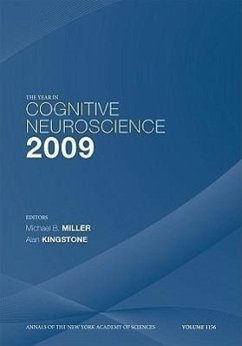
![Observations on the Deranged Manifestations of the Mind, or, Insanity [electronic Resource] Cover Observations on the Deranged Manifestations of the Mind, or, Insanity [electronic Resource]](https://bilder.buecher.de/produkte/65/65631/65631758n.jpg)



